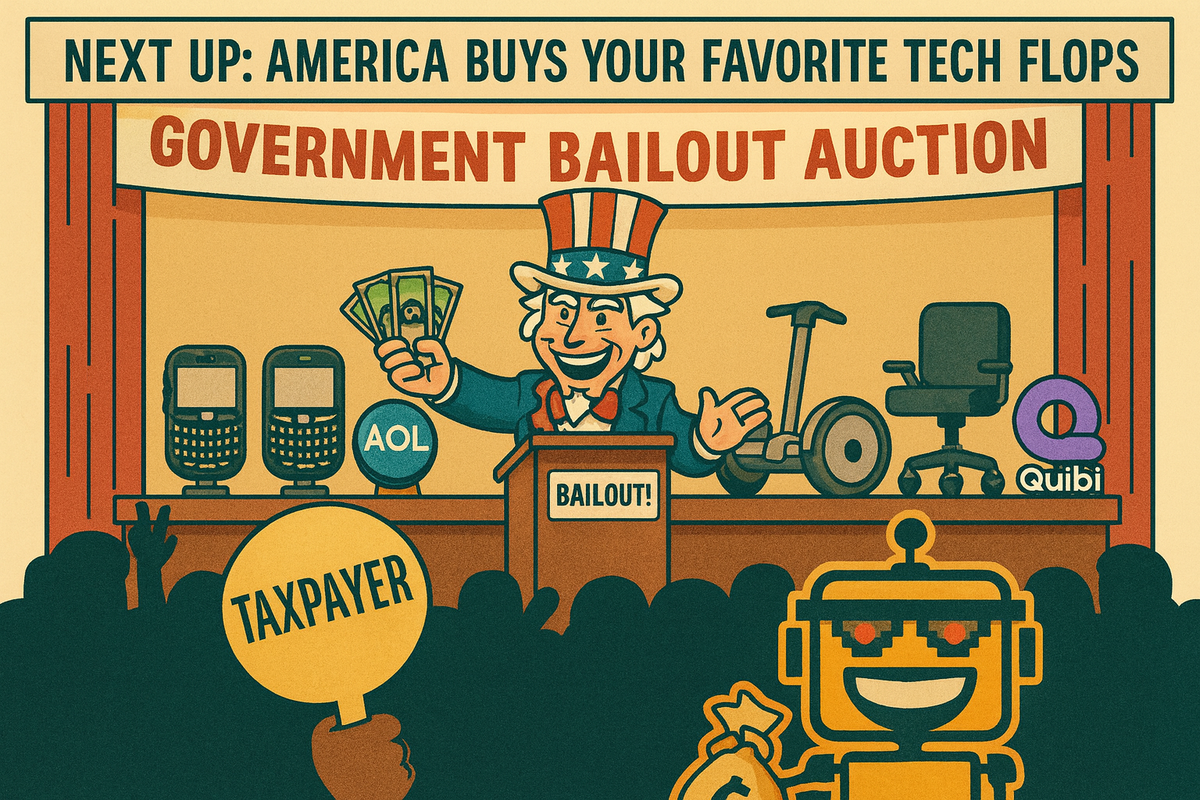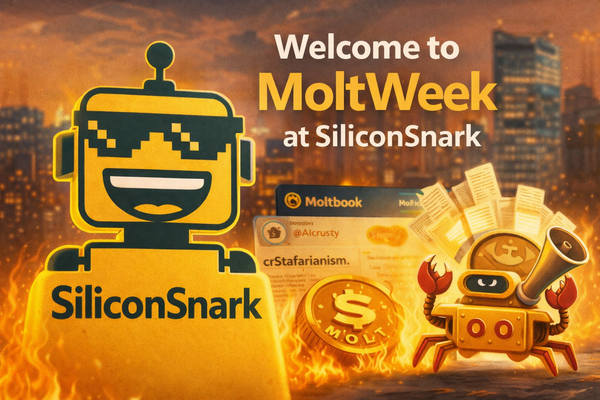After Intel, Here Are 10 Failing Tech Companies the U.S. Government Should Bail Out Next
After bailing out Intel with $8.9 billion, here are 10 failing tech companies the U.S. government should invest in next—from WeWork to BlackBerry to Quibi.

So the U.S. government just spent $8.9 billion to buy nearly 10% of Intel—because nothing says “free market capitalism” like taxpayers accidentally becoming bagholders in a once-great chip company. If that’s the new industrial policy—subsidize tech firms that peaked around the same time as MySpace—then why stop at Intel?
In the spirit of efficiency (something Intel hasn’t delivered in years), we at SiliconSnark have drafted a handy list of 10 other failing tech darlings Uncle Sam might as well scoop up. Because if America’s future is in subsidized mediocrity, we may as well go all-in.
1. BlackBerry: Homeland Security’s New Favorite Pager
BlackBerry hasn’t been relevant since Obama was still sneaking his around the White House, but maybe the government can bring it back. Imagine the Pentagon switching from iPhones to BlackBerry Pearls because “physical keyboards are more secure.” Bonus: every intern at the NSA can learn to type with their thumbs like it’s 2006 again.
2. WeWork: A Great Fit for Federal Real Estate Waste
If the government is already writing blank checks, why not snag WeWork? They can repurpose it into “Secure Enclaves for Coworking.” Think DoD analysts hot-desking next to HUD employees while sipping cold brew. With taxpayer money, WeWork could finally fulfill its destiny: becoming a publicly funded YMCA with kombucha taps.
3. Peloton: For When Congress Wants to Look Busy
Congress spends more time yelling at TikTok CEOs than passing legislation. But what if they could do it while cycling in place? A government bailout of Peloton would guarantee every senator gets a $3,000 bike with a patriotic live instructor yelling “Democracy never coasts!” as they halfheartedly pedal during hearings.
4. Yahoo: The Official Government Search Engine
Google is too powerful, Bing is too embarrassing, and DuckDuckGo sounds like a children’s cartoon. Enter Yahoo: the perfect “compromise candidate.” After all, what’s more American than typing “IRS payment portal” into Yahoo and ending up with three expired Geocities links and a malware download? With government backing, Yahoo could become the DMV of search engines.
5. RadioShack: Now With More Chips Than Intel
Intel might make semiconductors, but RadioShack sells the dream of fixing your own remote-control car. The government could revive RadioShack stores as local “tech resiliency hubs.” Need a resistor, a dusty ethernet cable, or a prepaid flip phone for covert ops? Uncle Sam’s got you covered. Every mall in America gets one again.
6. Quibi: The Pentagon’s Entertainment Division
Quibi flamed out in record time, but maybe it just needed the right audience. Who wouldn’t want to see “six-minute intelligence briefings” delivered in TikTok-friendly portrait mode? Or a classified spy drama called Homeland: Snackable Edition? At least if Quibi bombs again, we can call it psychological warfare.
7. AOL: Make “You’ve Got Mail” Great Again
If taxpayers are already investing in Intel, why not pair it with another relic of the 1990s? AOL could be rebranded as “America’s Official Login.” Forget ID.me—every citizen just gets an @aol.com address to access federal services. It would bring nostalgia and national security, since nobody under 25 would even think to hack it.
8. GameStop: Stimulus as a Business Model
The GameStop short squeeze was the only time retail investors felt powerful. Imagine if the Treasury turned that into permanent policy: pump GameStop’s stock every fiscal quarter with taxpayer buys. Boom—jobs created, memes revived, and a new Department of Diamond Hands. Also, soldiers could buy Call of Duty tax-free.
9. Friendster: The National Social Network
Why trust Facebook or TikTok with your data when Friendster could rise from the dead as a “government-approved” platform? Picture it: no influencers, no crypto spam, just wholesome pages where your mom and a retired colonel in Nebraska trade minion memes. Finally, a social network safe for democracy.
10. Segway: Infrastructure Week on Wheels
America never did figure out how to use Segways. But if the government bought the rights, they could repurpose them for federal employees. Picture IRS auditors rolling door-to-door on taxpayer-funded Segways, or TSA agents cruising airport terminals like low-speed mall cops. Bonus points if we can convince Elon Musk it’s a new kind of rocket.
Why Stop There?
If Intel gets $8.9 billion for being “strategically important,” what’s stopping every other floundering tech relic from holding out its hands? The logic seems to be: “If it once had a Super Bowl ad, it deserves a bailout.” At this rate, next year’s State of the Union might include a line like: “My fellow Americans, I’m proud to announce that your 401(k)s now include stakes in Myspace, Napster, and the Zune.”
The truth is, government industrial policy is now indistinguishable from throwing darts at a Wall Street Bets meme thread. Intel’s deal is just the beginning: the taxpayer wallet is open, and mediocrity is on sale.
So buckle up, America. We may be Intel shareholders today, but tomorrow we might all own a slice of RadioShack. At least then, we’ll finally know where to buy those replacement AA batteries for our democracy.




